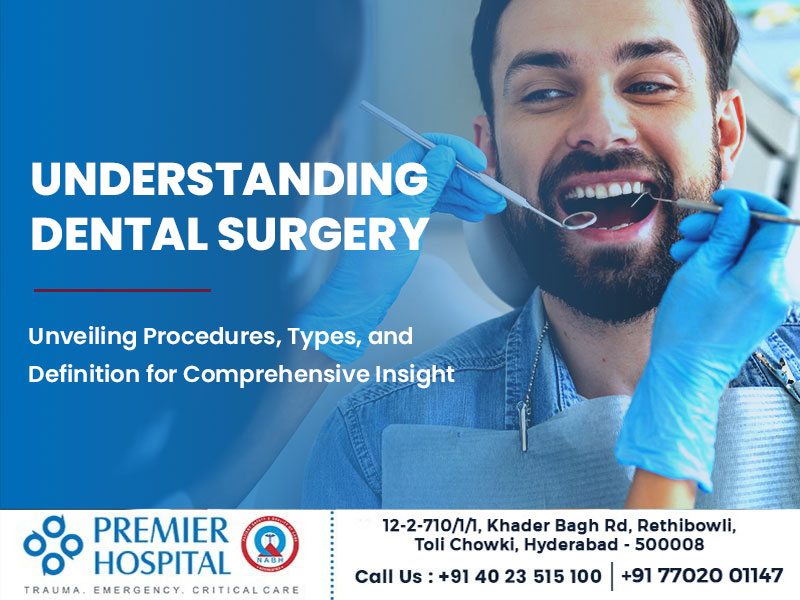Dental Surgery: Procedures, Types, Insight
by Premier Hospitals | March 5, 2024 |
Understanding Dental Surgery: Unveiling Procedures, Types, and Definition for Comprehensive Insight
Table Of Contents
- What is Dental Surgery?
- Why is Dental Surgery Performed?
- Different Types of Dental Surgery
- Who Performs Dental Surgery?
- What Happens Before Dental Surgery?
- What Happens During Dental Surgery?
- How Long Does Dental Surgery Take?
- What Happens After Dental Surgery?
- What are the Risks or Complications of Not Doing Dental Surgery?
- What is the Recovery Time?
- When to Visit the Doctor
- Maintaining Dental Health at Home
- Conclusion:
What is Dental Surgery?
Dental surgery refers to a set of surgical procedures conducted in the oral cavity to diagnose, treat, or prevent various dental and oral health issues. These procedures can range from routine tooth extractions to complex surgeries involving the jaw, gums, and other oral structures. Dental surgery aims to restore oral health, alleviate pain, and improve the functionality and aesthetics of the teeth and surrounding tissues.Why is Dental Surgery Performed?
Dental surgery is performed for various reasons, addressing common and complex oral health issues. Some common reasons include:- Tooth Extractions: Removal of damaged, decayed, or impacted teeth.
- Wisdom Teeth Removal: Extracting third molars to prevent impaction or other complications.
- Dental Implant Placement: Surgically placing implants to replace missing teeth.
- Gum Surgery: Treating gum diseases or reshaping gum tissues for cosmetic reasons.
- Jaw Surgeries: Correcting jaw misalignments, TMJ disorders, or other structural issues.
- Root Canal Surgery: Treating infections or damage to the tooth's pulp.
Different Types of Dental Surgery
Dental surgery encompasses a wide array of procedures. Some of the most common types include:- Oral and Maxillofacial Surgery: Involves surgeries related to the face, jaw, and oral cavity.
- Periodontal Surgery: Focuses on treating gum diseases and conditions affecting the supporting structures of teeth.
- Endodontic Surgery: Addresses issues within the tooth, such as root canal surgery.
- Prosthodontic Surgery: Involves the placement of dental prosthetics, such as implants or dentures.
- Orthognathic Surgery: Corrects jaw and facial irregularities to improve bite and appearance.
Who Performs Dental Surgery?
Dental surgery is typically performed by oral and maxillofacial surgeons, periodontists, endodontists, and prosthodontists, depending on the procedure. These specialists undergo extensive training and education to perform surgical interventions related to oral health.What Happens Before Dental Surgery?
Before dental surgery, a thorough examination is conducted, including dental X-rays and other diagnostic tests. The dentist or oral surgeon will discuss the procedure, potential risks, and available alternatives with the patient. Preoperative instructions, such as fasting before surgery, may be provided, and any concerns or questions from the patient are addressed.What Happens During Dental Surgery?
The specifics of dental surgery vary depending on the type of procedure. Local or general anesthesia is often administered to ensure the patient's comfort. During the surgery, the oral surgeon follows precise protocols, utilizing specialized instruments to perform the necessary interventions. The duration of the surgery depends on its complexity and the number of teeth or structures involved.How Long Does Dental Surgery Take?
The duration of dental surgery varies widely. Simple procedures, such as routine extractions, may take only a few minutes, while more complex surgeries, such as orthognathic surgery, can take several hours. The oral surgeon will provide an estimated time frame during the preoperative consultation.What Happens After Dental Surgery?
Following dental surgery, patients are monitored in a recovery area until the effects of anesthesia wear off. Postoperative care instructions, including pain management, diet restrictions, and oral hygiene practices, are provided. Patients are often advised to rest and avoid strenuous activities for a certain period. Follow-up appointments are scheduled to assess healing and address any concerns.What are the Risks or Complications of Not Doing Dental Surgery?
Delaying or avoiding necessary dental surgery can lead to various risks and complications. These may include:- Infection: Untreated dental issues can result in the spread of infection to surrounding tissues.
- Tooth Loss: Failure to address decay or damage may lead to the loss of affected teeth.
- Chronic Pain: Conditions like impacted wisdom teeth can cause persistent pain if not treated.
- Structural Issues: Failure to correct jaw misalignments can affect bite and facial aesthetics.
What is the Recovery Time?
Recovery time after dental surgery varies based on the procedure's complexity and the individual's overall health. Simple extractions may require only a day or two of recovery, while more extensive surgeries may involve weeks of healing. The oral surgeon will provide detailed recovery instructions and schedule follow-up appointments to monitor progress.When to Visit the Doctor
Patients should contact their oral surgeon or dentist if they experience:- Excessive bleeding that doesn't subside.
- Severe pain or discomfort not alleviated by prescribed medications.
- Swelling or signs of infection, such as persistent fever.
- Any concerns or complications related to the surgical site.
- Changes in bite or difficulty in chewing after oral surgery.
Maintaining Dental Health at Home
While dental surgery plays a crucial role in addressing specific issues, maintaining good oral hygiene at home is essential for preventing the need for extensive surgical interventions. Here are some practices to promote optimal dental health:- Brushing and Flossing: Maintain a consistent routine of brushing teeth twice a day and flossing to remove plaque and prevent cavities.
- Regular Dental Check-ups: Schedule regular dental check-ups for professional cleanings and early detection of potential issues.
- Avoid Tobacco and Limit Alcohol: Tobacco use and excessive alcohol consumption can contribute to oral health problems.
- Wear Mouthguards: If engaging in sports or activities with a risk of oral injuries, wear protective mouthguards.



















